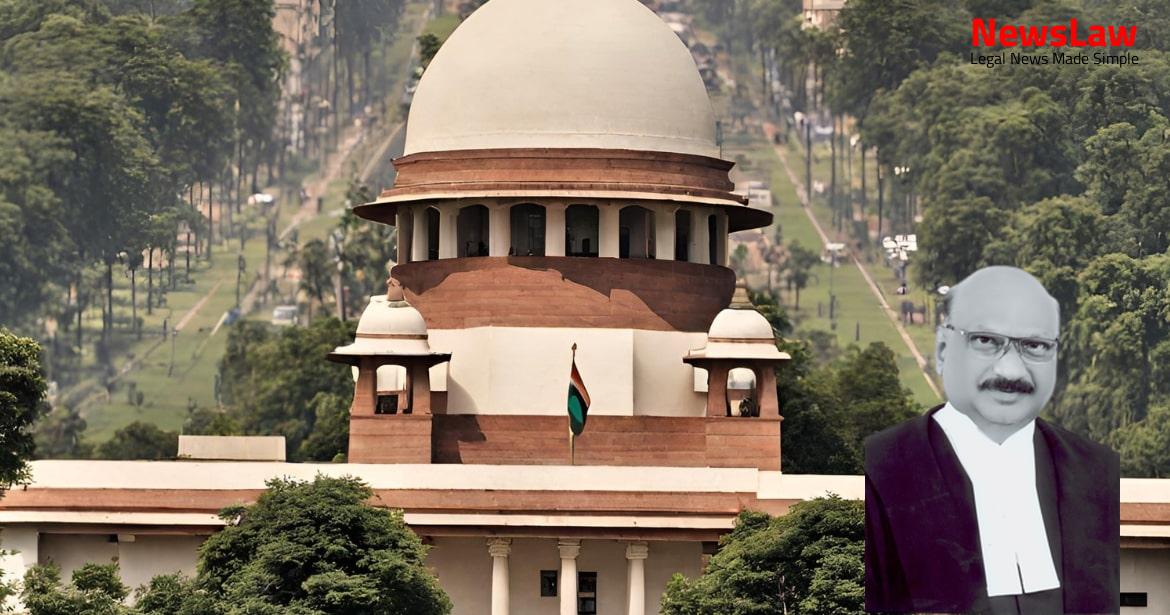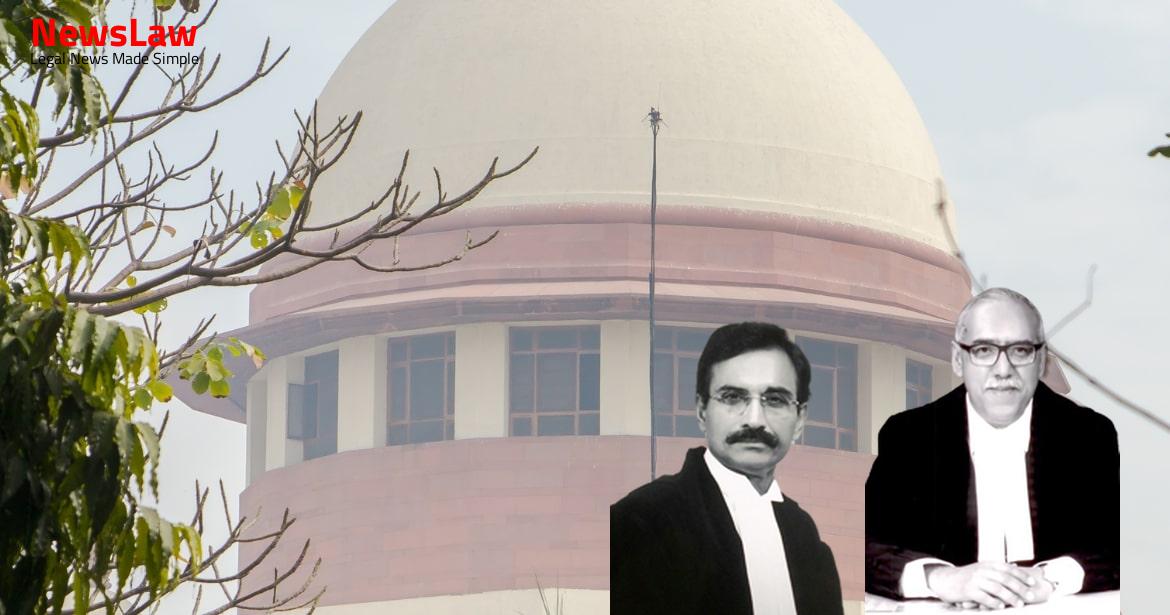In a significant legal case regarding land acquisition, the Supreme Court of India has delivered a judgement on possession delivery. The case involves a dispute over possession of land between the decree holder and the judgment debtor. Stay tuned to learn more about the outcomes and implications of this ruling.
Facts
- Execution proceedings dismissed as barred by time with liberty to file a substantive civil suit for possession.
- Decree holder filed regular second appeal in 2019 against the High Court’s order.
- Judgment debtor’s writ petition challenging land acquisition proceedings dismissed on 10.04.1989.
- Decree holder filed a fresh suit for possession on 11.01.2000 after acceptance of possession report in execution proceedings.
- Judgment debtor filed Miscellaneous Application in execution proceedings to restrain dispossession from suit lands.
- Decree holder’s suit for possession decreed and judgment debtor’s suit for injunction dismissed.
- Judgment debtor’s application under Order 7 Rule 11 CPC to reject decree holder’s suit rejected.
- Civil Revision No. 4522 of 2009 by judgment debtor dismissed by High Court.
- Decree holder remained in possession by order of status quo from the court.
- Fresh execution proceedings initiated by decree holder on 26.05.2012.
- Judgment debtor filed Civil Suit No.236 of 1998 seeking permanent injunction.
- Objections filed by judgment debtor under Order 21 Rules 97 & 99 CPC in execution proceedings.
- Execution proceedings closed on 24.10.2013 after delivery of possession.
- The order of status quo in Civil Appeal No.1637 of 2011 was a result of execution proceedings initiated on 27.03.1990 by a claimant who had not been compensated for acquired lands.
- Due to the unpaid compensation, the suit lands were attached as ownership now belonged to the State by virtue of the land acquisition.
- The status quo was a temporary measure to maintain the current state of affairs until the legal issues surrounding the compensation and ownership could be resolved.
Also Read: Judicial Standards and Compulsory Retirement Case: Supreme Court of India Judgment
Issue
- Delivery of possession to the decree holder was conducted with police assistance.
- There were no specific orders from the Court for providing police assistance during the delivery.
- The absence of court orders for police assistance raised concerns about the legality and validity of the possession delivery process.
- The issue at hand is whether the involvement of police assistance without court orders affected the execution of possession delivery.
Also Read: Land Ownership Dispute: Supreme Court Judgment on Correcting Revenue Records
Arguments
- Decree holder did not request deployment of police force for execution of the decree.
- Tehsildar sought police assistance from District Magistrate due to law and order concerns.
- Commissioner of Police directed the deployment of police force for delivery of possession.
- Anxiety expressed by the High Court regarding the use of police force in execution proceedings is justified.
- Resorting to police force for possession without appropriate orders from the executing court is a dangerous practice.
- Deputy Commissioner instructed Tehsildar to send compliance report directly to the court.
Also Read: Justice Served: Acquittal Upheld in Pradhan v. State
Analysis
- The police delivery of possession outside the court procedure was unwarranted and unauthorized, with no evidence of decree holder involvement.
- Despite the decree, the judgment debtor obstructed possession delivery, leading to execution delays.
- No report requesting police assistance was made under Order 21 Rule 35(3) CPC for possession delivery.
- Authorities proceeded with improper delivery warrants despite fresh warrants being issued.
- Authorities acted prematurely without proper court orders for police assistance, despite knowing possession was court-ordered.
- The judgment debtor’s awareness of land acquisition and failed legal challenges indicate the apprehensions expressed during possession delivery were not unfounded.
- The judgment debtor unlawfully remained in possession as a purchaser, but was required to vacate the premises.
- Fresh warrants for possession were repeatedly issued due to the judgment debtor’s non-compliance.
- The request for police assistance by the Tehsildar was forwarded through the Sub-Divisional Magistrate, but no report was submitted by the bailiff for police assistance.
- The anxiety expressed by the High Court is justified given the circumstances.
- Though we understand and agree with the High Court’s concerns, we choose not to interfere with the possession order due to the lack of right, title, or interest of the judgment debtor in the lands in question.
- The order should not be seen as a pardon for the actions of the executive authorities who mishandled the situation. Any future actions without court orders will be the responsibility and liability of the authorities themselves.
- This decision is made based on the specific details of this case.
Decision
- The impugned order has been modified by setting aside the part directing redelivery of possession to the judgment debtor.
- Execution proceedings have been revived for fresh delivery of possession to the decree holder.
- The appeals and contempt petition have been disposed of with this modification in place.
Case Title: OM PARKASH Vs. AMAR SINGH .
Case Number: C.A. No.-008175-008175 / 2019



